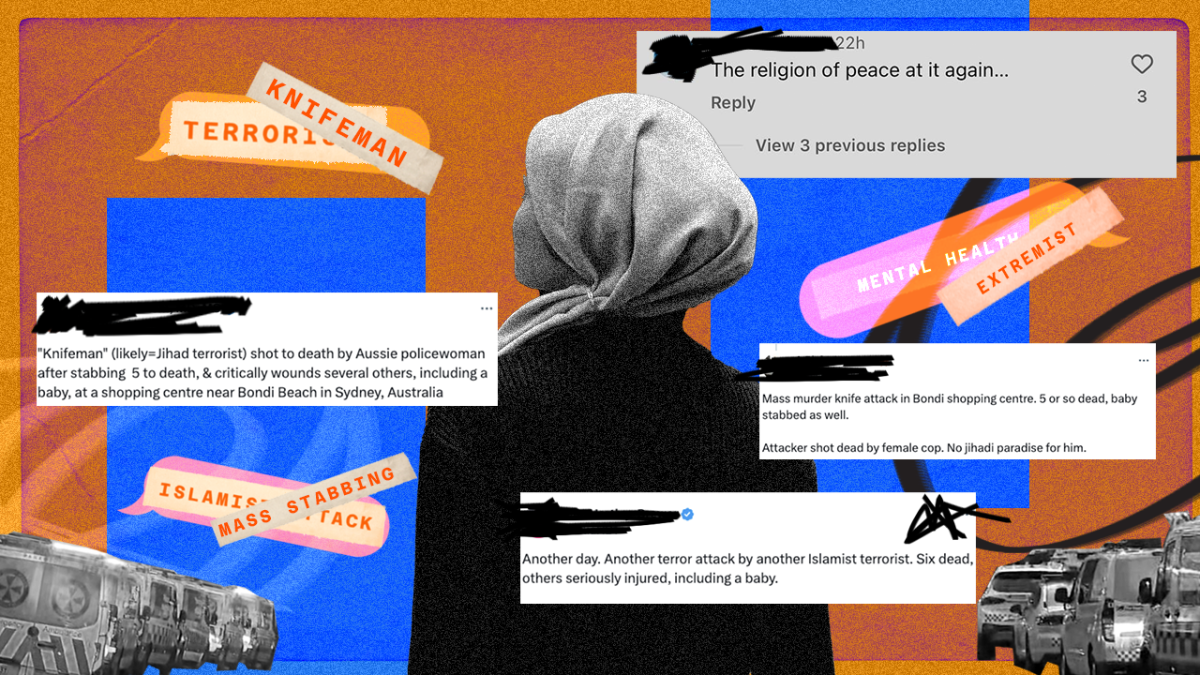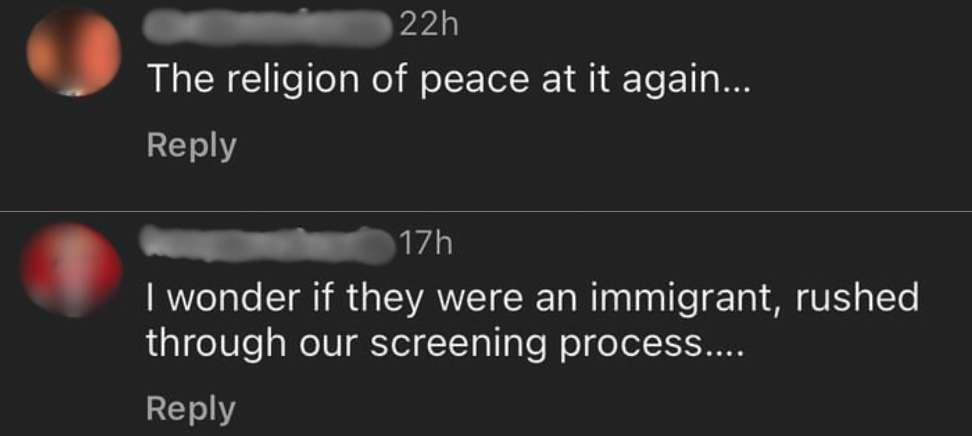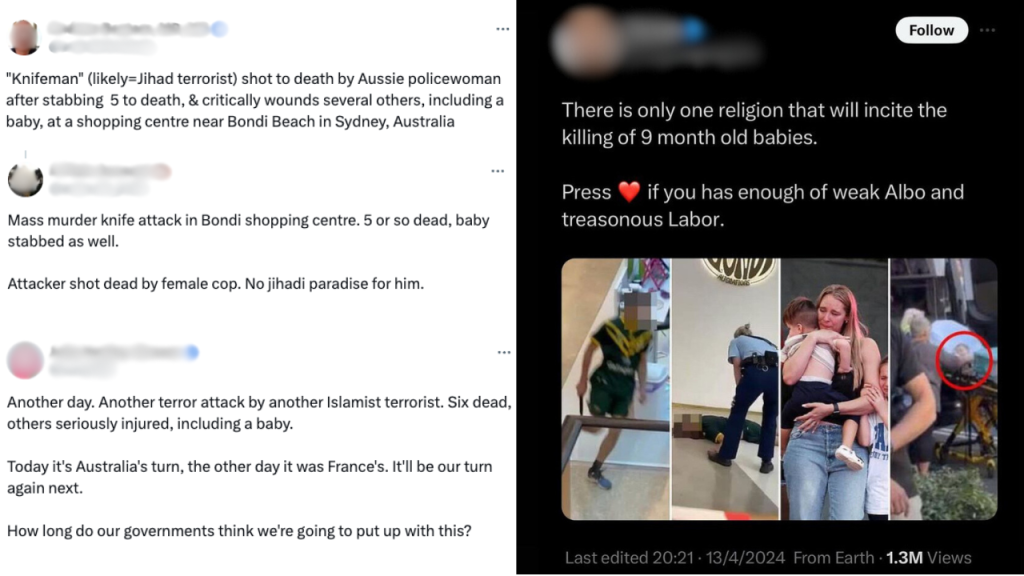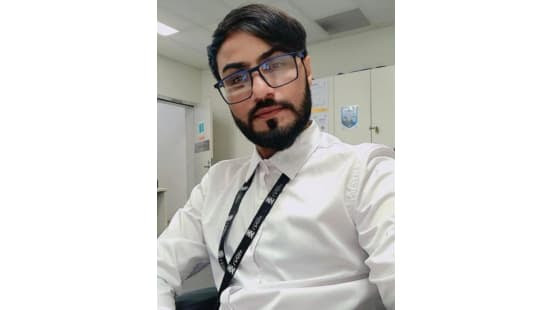
CONTENT WARNING: This article discusses racist and Islamophobic comments, and may be distressing to some readers.
Six people were killed and at least 17 injured in a mass stabbing attack in Bondi Junction Westfield on Saturday. The perpetrator was 40-year-old Queensland man Joel Cauchi, whose motivation is yet to be revealed). But before his identity was made public, people were quick to assume the killer was Muslim and branded the attacks as “Islamist terrorism”. And while these people may rush to delete their racist tweets now, the almost gleeful speed at which Muslims were turned on and demonised for an attack that had nothing to do with us — and that we lost one of our own to — is not something I will forget.
I was three years old when 9/11 happened — basically an infant, with no memory of the Before Times my family sometimes wistfully speaks about, when Muslims in Australia were met with curiosity or confusion, not hostility and fear.
By the time I was five years old and in kindergarten, I had some inkling that we were an “other” in some way. When I was eight years old, I was verbally abused for the first time by a white man in the parking lot of the Flemington Markets, further cementing that feeling. At 10 years old, I started wearing a hijab full-time — which meant experiences like that only escalated.
When I was in high school, the Lindt cafe siege in Sydney happened, and the Paris terror attacks not long after.
The fear of retaliation and collective punishment from the Muslim community was real — some girls at my school who wore hijabs stayed home, others were escorted in and out of the school by family members who feared for their daughters catching public transport alone in such a politically charged time. It was also around this time that Sonia Kruger famously called for a ban on Muslims entering Australia at all — a claim that should have been slammed as sensationalist and harmful, but of course, many Australians agreed with her.
The post 9/11 world — the demonisation of Arabs and Muslims, the mass bombing of our people for crimes they didn’t commit, the 100% success rate of being “randomly” selected for search at the airport — for young people like me, is not really “post” anything. It’s just our lives. It’s the only reality we know, and one we became quickly accustomed to.
However, I am not alone among Australian Muslims in thinking that in recent years, things might be on the mend — in small ways, at least. We have a hijabi news anchor at Channel 9, I am no longer scared of going to Cronulla Beach, celebrities are openly discussing Palestine at the Oscars, and here I am — against all odds — a Muslim journalist myself. I have the pleasure and privilege of being able to tell our stories in ways I rarely got to see growing up.
But in the last six months, and especially in the last two days, it’s become clear that the dehumanisation and cruelty Muslims face in Australia is still potent.
From the moment reports emerged of multiple stabbings at Bondi Junction Westfield, social media posts and comments immediately, openly, and gleefully accused the perpetrator of being Muslim. Many commenters said they “don’t even need to know the skin colour” of the knifeman, because “this has ‘the religion of peace’ written all over it.”

It doesn’t matter that Islam has no colour — it’s a religion, not an ethnic group — or that Muslims are the group most victimised by terrorism. People still equate Muslims, Brown people and terrorism as all the same thing, more than two decades after 9/11. It’s telling that the 2019 Christchurch attack, in which a white Australian gunman killed more than 50 Muslim worshippers — including children — has already been forgotten.
Before the Bondi Junction attacker was named, he was accused online of being a “Hamas supporter”, an “Islamic extremist” and an “Islamic terrorist”, despite no official media or reports to verify this claim. Others claimed the attacker was a migrant or refugee. The comments came both from Australians, and those overseas excited to find validation for their bigotry.

The claims spread like wildfire — they can be found in the comments of every report, Instagram post, TikTok and Twitter thread from that day. This was actually how I learned of the Bondi attack in the first place — my mum showed me a tweet which said, as if it were fact, that there had been an “Islamist terror attack”. She expressed her fear of what this would mean for Muslims in Australia, if this would be like the Lindt seige again.
It was soon confirmed by NSW Police that there was no “religious ideology” behind the Bondi stabbings, and that the perpetrator was a white man from Queensland named Joel Cauchi — not an “Achmed” or “Mohamed” as some racists had joked online.
Five of the six victims were women, a key line of enquiry police are pursuing to determine the motivation of the attacks. The one man Cauchi killed was young Pakistani Muslim refugee Faraz Tahir, a security guard who was on his first day shift on the job in Bondi Junction Westfield after fleeing to Australia last year. He was part of the Ahmadiyya Muslim Community, and actively involved in the community’s youth organisation.

Tahir, an immigrant, died trying to protect shoppers from Cauchi, an Australian — and yet it was his people that were demonised and blamed for the attack.
In other news interviews, it was revealed that some of the witnesses and shop assistants who ushered shoppers to safety were also Muslim. Their heroism doesn’t rehabilitate our image in the eyes of racists though, as positive stories about us never have, and even writing this now, I feel a lump in my throat at the injustice of it all.
The instant Cauchi’s identity was revealed, racist tweets were deleted, comments turned off, Stories disappeared. “Terrorist” was changed to “knifeman”, “Islamist attack” was changed to “mass stabbing” and “Hamas-sympathising” was changed to “mentally disturbed”. Never mind the discourse we could be having about the fact that Muslims who commit mass violence also suffer from the same disenfranchisement, alienation and mental health issues that their white counterparts do — that’s a discussion for another day — but the point is, it’s clear violence is considered as an anomaly for white men, but an innate pattern for Muslims.
People can erase their digital history of Islamophobic and racist misinformation, but I saw it, and so did every other Muslim in Australia. And we don’t get to delete the trauma and fear and rage that those posts created. We don’t get to wash our hands of the hurt they caused.
Now, more than ever, is a reminder to the wider Australian public that racism and Islamophobia is alive and well, and you have duty to stand up against it — because we’re fucking tired.
Help is available.
- If you require immediate assistance, please call 000.
- If you are in distress, please call Lifeline on 13 11 14 or chat online.
- Under 25? You can reach Kids Helpline at 1800 55 1800 or chat online.
- You can also report instances of racism or discrimination to the Australian Human Rights Commission on 1300 656 419 or lodge a complaint online.



